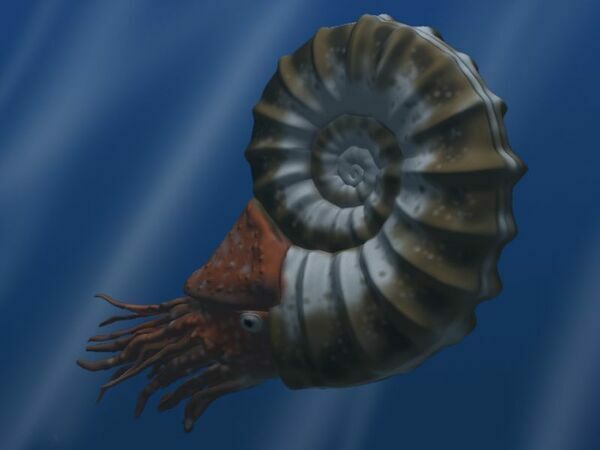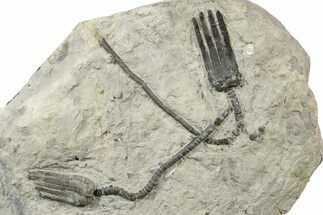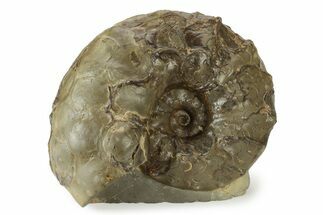5.15" Triassic Ammonite (Ceratites) Fossil - Germany
This is a 5.15" wide specimen of a Middle Triassic ammonite (Ceratites sublaevigatus). It comes from the the Muschelkalk Formation in Germany. It was found inside of a hard concretion and has been nicely prepared with all of the surrounding rock removed.
There is some significant restoration towards the center spiral (darkest area) and multiple repaired cracks through the ammonite.
It comes with an acrylic display stand.
There is some significant restoration towards the center spiral (darkest area) and multiple repaired cracks through the ammonite.
It comes with an acrylic display stand.
About Ammonites
Ammonites were ancient marine cephalopods, similar to today's squids and octopuses, but with a defining feature: their distinctive, tightly coiled spiral shells. These shells, resembling those of modern nautiluses, served as both a protective home and a buoyancy aid, allowing ammonites to navigate the prehistoric seas with ease. First emerging around 240 million years ago in the Triassic Period, ammonites thrived for over 175 million years, adapting through numerous forms and sizes. As predatory creatures, they likely fed on smaller marine organisms, using their tentacles to capture prey. However, their long reign came to an end 65 million years ago at the close of the Cretaceous, coinciding with the mass extinction event that also eliminated the dinosaurs.
Ammonites were ancient marine cephalopods, similar to today's squids and octopuses, but with a defining feature: their distinctive, tightly coiled spiral shells. These shells, resembling those of modern nautiluses, served as both a protective home and a buoyancy aid, allowing ammonites to navigate the prehistoric seas with ease. First emerging around 240 million years ago in the Triassic Period, ammonites thrived for over 175 million years, adapting through numerous forms and sizes. As predatory creatures, they likely fed on smaller marine organisms, using their tentacles to capture prey. However, their long reign came to an end 65 million years ago at the close of the Cretaceous, coinciding with the mass extinction event that also eliminated the dinosaurs.
$195
SPECIES
Ceratites sublaevigatus
LOCATION
Lindbach, Bavaria, Germany
FORMATION
Muschelkalk Formation
SIZE
Ammonite 5.15" across
CATEGORY
SUB CATEGORY
ITEM
#243503
We guarantee the authenticity of all of our specimens.
 Reviews
Reviews












